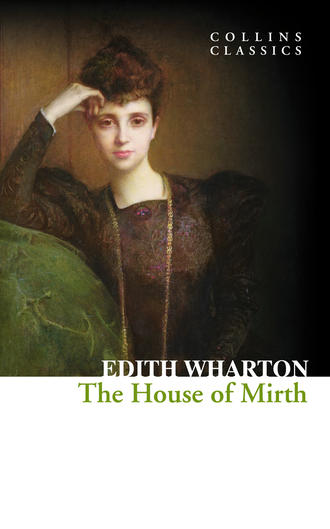
Полная версия
The House of Mirth
In this desultory yet agitated fashion life went on through Lily’s teens: a zig-zag broken course down which the family craft glided on a rapid current of amusement, tugged at by the underflow of a perpetual need—the need of more money. Lily could not recall the time when there had been money enough, and in some vague way her father seemed always to blame for the deficiency. It could certainly not be the fault of Mrs. Bart, who was spoken of by her friends as a “wonderful manager”. Mrs. Bart was famous for the unlimited effect she produced on limited means; and to the lady and her acquaintances there was something heroic in living as though one were much richer than one’s bank-book denoted.
Lily was naturally proud of her mother’s aptitude in this line: she had been brought up in the faith that, whatever it cost, one must have a good cook, and be what Mrs. Bart called “decently dressed”. Mrs. Bart’s worst reproach to her husband was to ask him if he expected her to “live like a pig”; and his replying in the negative was always regarded as a justification for cabling to Paris for an extra dress or two, and telephoning to the jeweller that he might, after all, send home the turquoise bracelet which Mrs. Bart had looked at that morning.
Lily knew people who “lived like pigs”, and their appearance and surroundings justified her mother’s repugnance to that form of existence. They were mostly cousins, who inhabited dingy houses with engravings from Cole’s Voyage of Life on the drawing-room walls, and slatternly parlour-maids who said “I’ll go and see” to visitors calling at an hour when all right-minded persons are conventionally if not actually out. The disgusting part of it was that many of these cousins were rich, so that Lily imbibed the idea that if people lived like pigs it was from choice, and through the lack of any proper standard of conduct. This gave her a sense of reflected superiority, and she did not need Mrs. Bart’s comments on the family frumps and misers to foster her naturally lively taste for splendour.
Lily was nineteen when circumstances caused her to revise her view of the universe.
The previous year she had made a dazzling debut fringed by a heavy thunder-cloud of bills. The light of the debut still lingered on the horizon, but the cloud had thickened; and suddenly it broke. The suddenness added to the horror; and there were still times when Lily relived with painful vividness every detail of the day on which the blow fell. She and her mother had been seated at the luncheon-table, over the chaufroix and cold salmon of the previous night’s dinner: it was one of Mrs. Bart’s few economies to consume in private the expensive remnants of her hospitality. Lily was feeling the pleasant languor which is youth’s penalty for dancing till dawn; but her mother, in spite of a few lines about the mouth, and under the yellow waves on her temples, was as alert, determined and high in colour as if she had risen from an untroubled sleep.
In the centre of the table, between the melting marrons glacés and candied cherries, a pyramid of American Beauties lifted their vigorous stems; they held their heads as high as Mrs. Bart, but their rose-colour had turned to a dissipated purple, and Lily’s sense of fitness was disturbed by their reappearance on the luncheon-table.
“I really think, mother,” she said reproachfully, “we might afford a few fresh flowers for luncheon. Just some jonquils or lilies-of-the-valley—”
Mrs. Bart stared. Her own fastidiousness had its eye fixed on the world, and she did not care how the luncheon-table looked when there was no one present at it but the family. But she smiled at her daughter’s innocence.
“Lilies-of-the-valley,” she said calmly, “cost two dollars a dozen at this season.”
Lily was not impressed. She knew very little of the value of money.
“It would not take more than six dozen to fill that bowl,” she argued.
“Six dozen what?” asked her father’s voice in the doorway.
The two women looked up in surprise; though it was a Saturday, the sight of Mr. Bart at luncheon was an unwonted one. But neither his wife nor his daughter was sufficiently interested to ask an explanation.
Mr. Bart dropped into a chair, and sat gazing absently at the fragment of jellied salmon which the butler had placed before him.
“I was only saying,” Lily began, “that I hate to see faded flowers at luncheon; and mother says a bunch of lilies-of-the-valley would not cost more than twelve dollars. Mayn’t I tell the florist to send a few every day?”
She leaned confidently toward her father: he seldom refused her anything, and Mrs. Bart had taught her to plead with him when her own entreaties failed.
Mr. Bart sat motionless, his gaze still fixed on the salmon, and his lower jaw dropped; he looked even paler than usual, and his thin hair lay in untidy streaks on his forehead. Suddenly he looked at his daughter and laughed. The laugh was so strange that Lily coloured under it: she disliked being ridiculed, and her father seemed to see something ridiculous in the request. Perhaps he thought it foolish that she should trouble him about such a trifle.
“Twelve dollars—twelve dollars a day for flowers? Oh, certainly, my dear—give him an order for twelve hundred.” He continued to laugh.
Mrs. Bart gave him a quick glance.
“You needn’t wait, Poleworth—I will ring for you,” she said to the butler.
The butler withdrew with an air of silent disapproval, leaving the remains of the chaufroix on the sideboard.
“What is the matter, Hudson? Are you ill?” said Mrs. Bart severely.
She had no tolerance for scenes which were not of her own making, and it was odious to her that her husband should make a show of himself before the servants.
“Are you ill?” she repeated.
“Ill?— No, I’m ruined,” he said.
Lily made a frightened sound, and Mrs. Bart rose to her feet.
“Ruined—?” she cried; but controlling herself instantly, she turned a calm face to Lily.
“Shut the pantry door,” she said.
Lily obeyed, and when she turned back into the room her father was sitting with both elbows on the table, the plate of salmon between them, and his head bowed on his hands.
Mrs. Bart stood over him with a white face which made her hair unnaturally yellow. She looked at Lily as the latter approached: her look was terrible, but her voice was modulated to a ghastly cheerfulness.
“Your father is not well—he doesn’t know what he is saying. It is nothing—but you had better go upstairs; and don’t talk to the servants,” she added.
Lily obeyed; she always obeyed when her mother spoke in that voice. She had not been deceived by Mrs. Bart’s words: she knew at once that they were ruined. In the dark hours which followed, that awful fact overshadowed even her father’s slow and difficult dying. To his wife he no longer counted: he had become extinct when he ceased to fulfil his purpose, and she sat at his side with the provisional air of a traveller who waits for a belated train to start. Lily’s feelings were softer: she pitied him in a frightened ineffectual way. But the fact that he was for the most part unconscious, and that his attention, when she stole into the room, drifted away from her after a moment, made him even more of a stranger than in the nursery days when he had never come home till after dark. She seemed always to have seen him through a blur—first of sleepiness, then of distance and indifference—and now the fog had thickened till he was almost indistinguishable. If she could have performed any little services for him, or have exchanged with him a few of those affecting words which an extensive perusal of fiction had led her to connect with such occasions, the filial instinct might have stirred in her; but her pity, finding no active expression, remained in a state of spectatorship, overshadowed by her mother’s grim unflagging resentment. Every look and act of Mrs. Bart’s seemed to say: “You are sorry for him now—but you will feel differently when you see what he has done to us.”
It was a relief to Lily when her father died.
Then a long winter set in. There was a little money left, but to Mrs. Bart it seemed worse than nothing—the mere mockery of what she was entitled to. What was the use of living if one had to live like a pig? She sank into a kind of furious apathy, a state of inert anger against fate. Her faculty for “managing” deserted her, or she no longer took sufficient pride in it to exert it. It was well enough to “manage” when by so doing one could keep one’s own carriage; but when one’s best contrivance did not conceal the fact that one had to go on foot, the effort was no longer worth making.
Lily and her mother wandered from place to place, now paying long visits to relations whose house-keeping Mrs. Bart criticized, and who deplored the fact that she let Lily breakfast in bed when the girl had no prospects before her, and now vegetating in cheap continental refuges, where Mrs. Bart held herself fiercely aloof from the frugal tea-tables of her companions in misfortune. She was especially careful to avoid her old friends and the scenes of her former successes. To be poor seemed to her such a confession of failure that it amounted to disgrace; and she detected a note of condescension in the friendliest advances.
Only one thought consoled her, and that was the contemplation of Lily’s beauty. She studied it with a kind of passion, as though it were some weapon she had slowly fashioned for her vengeance. It was the last asset in their fortunes, the nucleus around which their life was to be rebuilt. She watched it jealously, as though it were her own property and Lily its mere custodian; and she tried to instil into the latter a sense of the responsibility that such a charge involved. She followed in imagination the career of other beauties, pointing out to her daughter what might be achieved through such a gift, and dwelling on the awful warning of those who, in spite of it, had failed to get what they wanted: to Mrs. Bart, only stupidity could explain the lamentable denouement of some of her examples. She was not above the inconsistency of charging fate, rather than herself, with her own misfortunes; but she inveighed so acrimoniously against love-matches that Lily would have fancied her own marriage had been of that nature, had not Mrs. Bart frequently assured her that she had been “talked into it”—by whom, she never made clear.
Lily was duly impressed by the magnitude of her opportunities. The dinginess of her present life threw into enchanting relief the existence to which she felt herself entitled. To a less illuminated intelligence Mrs. Bart’s counsels might have been dangerous; but Lily understood that beauty is only the raw material of conquest, and that to convert it into success other arts are required. She knew that to betray any sense of superiority was a subtler form of the stupidity her mother denounced, and it did not take her long to learn that a beauty needs more tact than the possessor of an average set of features.
Her ambitions were not as crude as Mrs. Bart’s. It had been among that lady’s grievances that her husband—in the early days, before he was too tired—had wasted his evenings in what she vaguely described as “reading poetry”; and among the effects packed off to auction after his death were a score or two of dingy volumes which had struggled for existence among the boots and medicine bottles of his dressing-room shelves. There was in Lily a vein of sentiment, perhaps transmitted from this source, which gave an idealizing touch to her most prosaic purposes. She liked to think of her beauty as a power for good, as giving her the opportunity to attain a position where she should make her influence felt in the vague diffusion of refinement and good taste. She was fond of pictures and flowers, and of sentimental fiction, and she could not help thinking that the possession of such tastes ennobled her desire for worldly advantages. She would not indeed have cared to marry a man who was merely rich: she was secretly ashamed of her mother’s crude passion for money. Lily’s preference would have been for an English nobleman with political ambitions and vast estates; or, for second choice, an Italian prince with a castle in the Apennines and an hereditary office in the Vatican. Lost causes had a romantic charm for her, and she liked to picture herself as standing aloof from the vulgar press of the Quirinal, and sacrificing her pleasure to the claims of an immemorial tradition …
How long ago and how far off it all seemed! Those ambitions were hardly more futile and childish than the earlier ones which had centred about the possession of a French jointed doll with real hair. Was it only ten years since she had wavered in imagination between the English earl and the Italian prince? Relentlessly her mind travelled on over the dreary interval …
After two years of hungry roaming Mrs. Bart had died—died of a deep disgust. She had hated dinginess, and it was her fate to be dingy. Her visions of a brilliant marriage for Lily had faded after the first year.
“People can’t marry you if they don’t see you—and how can they see you in these holes where we’re stuck?” That was the burden of her lament; and her last adjuration to her daughter was to escape from dinginess if she could.
“Don’t let it creep up on you and drag you down. Fight your way out of it somehow—you’re young and can do it,” she insisted.
She had died during one of their brief visits to New York, and there Lily at once became the centre of a family council composed of the wealthy relatives whom she had been taught to despise for living like pigs. It may be that they had an inkling of the sentiments in which she had been brought up, for none of them manifested a very lively desire for her company; indeed, the question threatened to remain unsolved till Mrs. Peniston with a sigh announced: “I’ll try her for a year.”
Every one was surprised, but one and all concealed their surprise, lest Mrs. Peniston should be alarmed by it into reconsidering her decision.
Mrs. Peniston was Mr. Bart’s widowed sister, and if she was by no means the richest of the family group, its other members nevertheless abounded in reasons why she was clearly destined by Providence to assume the charge of Lily. In the first place she was alone, and it would be charming for her to have a young companion. Then she sometimes travelled, and Lily’s familiarity with foreign customs—deplored as a misfortune by her more conservative relatives—would at least enable her to act as a kind of courier. But as a matter of fact Mrs. Peniston had not been affected by these considerations. She had taken the girl simply because no one else would have her, and because she had the kind of moral mauvaise honte which makes the public display of selfishness difficult, though it does not interfere with its private indulgence. It would have been impossible for Mrs. Peniston to be heroic on a desert island, but with the eyes of her little world upon her she took a certain pleasure in her act.
She reaped the reward to which disinterestedness is entitled, and found an agreeable companion in her niece. She had expected to find Lily headstrong, critical and “foreign”—for even Mrs. Peniston, though she occasionally went abroad, had the family dread of foreignness—but the girl showed a pliancy, which, to a more penetrating mind than her aunt’s, might have been less reassuring than the open selfishness of youth. Misfortune had made Lily supple instead of hardening her, and a pliable substance is less easy to break than a stiff one.
Mrs. Peniston, however, did not suffer from her niece’s adaptability. Lily had no intention of taking advantage of her aunt’s good nature. She was in truth grateful for the refuge offered her: Mrs. Peniston’s opulent interior was at least not externally dingy. But dinginess is a quality which assumes all manner of disguises; and Lily soon found that it was as latent in the expensive routine of her aunt’s life as in the makeshift existence of a continental pension.
Mrs. Peniston was one of the episodical persons who form the padding of life. It was impossible to believe that she had herself ever been a focus of activities. The most vivid thing about her was the fact that her grandmother had been a Van Alstyne. This connection with the well-fed and industrious stock of early New York revealed itself in the glacial neatness of Mrs. Peniston’s drawing-room and in the excellence of her cuisine. She belonged to the class of old New Yorkers who have always lived well, dressed expensively, and done little else; and to these inherited obligations Mrs. Peniston faithfully conformed. She had always been a looker-on at life, and her mind resembled one of those little mirrors which her Dutch ancestors were accustomed to affix to their upper windows, so that from the depths of an impenetrable domesticity they might see what was happening in the street.
Mrs. Peniston was the owner of a country-place in New Jersey, but she had never lived there since her husband’s death—a remote event, which appeared to dwell in her memory chiefly as a dividing point in the personal reminiscences that formed the staple of her conversation. She was a woman who remembered dates with intensity, and could tell at a moment’s notice whether the drawing-room curtains had been renewed before or after Mr. Peniston’s last illness.
Mrs. Peniston thought the country lonely and trees damp, and cherished a vague fear of meeting a bull. To guard against such contingencies she frequented the more populous watering-places, where she installed herself impersonally in a hired house and looked on at life through the matting screen of her verandah. In the care of such a guardian, it soon became clear to Lily that she was to enjoy only the material advantages of good food and expensive clothing; and, though far from underrating these, she would gladly have exchanged them for what Mrs. Bart had taught her to regard as opportunities. She sighed to think what her mother’s fierce energies would have accomplished, had they been coupled with Mrs. Peniston’s resources. Lily had abundant energy of her own, but it was restricted by the necessity of adapting herself to her aunt’s habits. She saw that at all costs she must keep Mrs. Peniston’s favour till, as Mrs. Bart would have phrased it, she could stand on her own legs. Lily had no mind for the vagabond life of the poor relation, and to adapt herself to Mrs. Peniston she had, to some degree, to assume that lady’s passive attitude. She had fancied at first that it would be easy to draw her aunt into the whirl of her own activities, but there was a static force in Mrs. Peniston against which her niece’s efforts spent themselves in vain. To attempt to bring her into active relation with life was like tugging at a piece of furniture which has been screwed to the floor. She did not, indeed, expect Lily to remain equally immovable: she had all the American guardian’s indulgence for the volatility of youth.
She had indulgence also for certain other habits of her niece’s. It seemed to her natural that Lily should spend all her money on dress, and she supplemented the girl’s scanty income by occasional “handsome presents” meant to be applied to the same purpose. Lily, who was intensely practical, would have preferred a fixed allowance; but Mrs. Peniston liked the periodical recurrence of gratitude evoked by unexpected cheques, and was perhaps shrewd enough to perceive that such a method of giving kept alive in her niece a salutary sense of dependence.
Beyond this, Mrs. Peniston had not felt called upon to do anything for her charge: she had simply stood aside and let her take the field. Lily had taken it, at first with the confidence of assured possessorship, then with gradually narrowing demands, till now she found herself actually struggling for a foothold on the broad space which had once seemed her own for the asking. How it happened she did not yet know. Sometimes she thought it was because Mrs. Peniston had been too passive, and again she feared it was because she herself had not been passive enough. Had she shown an undue eagerness for victory? Had she lacked patience, pliancy and dissimulation? Whether she charged herself with these faults or absolved herself from them, made no difference in the sum-total of her failure. Younger and plainer girls had been married off by dozens, and she was nine-and-twenty, and still Miss Bart.
She was beginning to have fits of angry rebellion against fate, when she longed to drop out of the race and make an independent life for herself. But what manner of life would it be? She had barely enough money to pay her dressmakers’ bills and her gambling debts; and none of the desultory interests which she dignified with the name of tastes was pronounced enough to enable her to live contentedly in obscurity. Ah, no—she was too intelligent not to be honest with herself. She knew that she hated dinginess as much as her mother had hated it, and to her last breath she meant to fight against it, dragging herself up again and again above its flood till she gained the bright pinnacles of success which presented such a slippery surface to her clutch.
CHAPTER 4
The next morning, on her breakfast tray, Miss Bart found a note from her hostess.
“Dearest Lily,” it ran, “if it is not too much of a bore to be down by ten, will you come to my sitting-room to help me with some tiresome things?”
Lily tossed aside the note and subsided on her pillows with a sigh. It was a bore to be down by ten—an hour regarded at Bellomont as vaguely synchronous with sunrise—and she knew too well the nature of the tiresome things in question. Miss Pragg, the secretary, had been called away, and there would be notes and dinner-cards to write, lost addresses to hunt up, and other social drudgery to perform. It was understood that Miss Bart should fill the gap in such emergencies, and she usually recognized the obligation without a murmur.
Today, however, it renewed the sense of servitude which the previous night’s review of her cheque-book had produced. Everything in her surroundings ministered to feelings of ease and amenity. The windows stood open to the sparkling freshness of the September morning, and between the yellow boughs she caught a perspective of hedges and parterres leading by degrees of lessening formality to the free undulations of the park. Her maid had kindled a little fire on the hearth, and it contended cheerfully with the sunlight which slanted across the moss-green carpet and caressed the curved sides of an old marquetry desk. Near the bed stood a table holding her breakfast tray, with its harmonious porcelain and silver, a handful of violets in a slender glass, and the morning paper folded beneath her letters. There was nothing new to Lily in these tokens of a studied luxury; but, though they formed a part of her atmosphere, she never lost her sensitiveness to their charm. Mere display left her with a sense of superior distinction; but she felt an affinity to all the subtler manifestations of wealth.
Mrs. Trenor’s summons, however, suddenly recalled her state of dependence, and she rose and dressed in a mood of irritability that she was usually too prudent to indulge. She knew that such emotions leave lines on the face as well as in the character, and she had meant to take warning by the little creases which her midnight survey had revealed.
The matter-of-course tone of Mrs. Trenor’s greeting deepened her irritation. If one did drag one’s self out of bed at such an hour, and come down fresh and radiant to the monotony of note-writing, some special recognition of the sacrifice seemed fitting. But Mrs. Trenor’s tone showed no consciousness of the fact.
“Oh, Lily, that’s nice of you,” she merely sighed across the chaos of letters, bills and other domestic documents which gave an incongruously commercial touch to the slender elegance of her writing-table.
“There are such lots of horrors this morning,” she added, clearing a space in the centre of the confusion and rising to yield her seat to Miss Bart.
Mrs. Trenor was a tall fair woman, whose height just saved her from redundancy. Her rosy blondness had survived some forty years of futile activity without showing much trace of ill-usage except in a diminished play of feature. It was difficult to define her beyond saying that she seemed to exist only as a hostess, not so much from any exaggerated instinct of hospitality as because she could not sustain life except in a crowd. The collective nature of her interests exempted her from the ordinary rivalries of her sex, and she knew no more personal emotion than that of hatred for the woman who presumed to give bigger dinners or have more amusing house-parties than herself. As her social talents, backed by Mr. Trenor’s bank-account, almost always assured her ultimate triumph in such competitions, success had developed in her an unscrupulous good nature toward the rest of her sex, and in Miss Bart’s utilitarian classification of her friends, Mrs. Trenor ranked as the woman who was least likely to “go back” on her.









